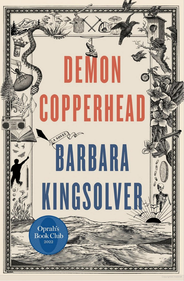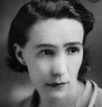A WRITER'S WIT |
MY BOOK WORLD

At first, I feel that the lad’s name, Demon Copperhead, seems a bit contrived—perhaps trying too hard to BE David Copperfield—as Kingsolver is forthcoming about her boilerplate use of Dickens’s beloved book. But as the pages fly by, his name takes on an earned significance. Eventually Demon Copperhead will become the name of his comic book character—artist Demon has a natural talent that a sensitive teacher nurtures along the way. Kingsolver’s novel is about a twenty-first century orphan, one who loses his father before he is born and loses his mother as a child to her drug addictions. Not just any “drugs.” And it is not an easy life, as Demon proclaims.
“Addiction is not for the lazy. The life has no ends of hazards, deadly ambushes lying in wait, and that’s just the drugs, not even discussing the people. If I was a fuckhead, I was one that knew how to apply himself . . . I’d only ever lived one way, by devoting myself completely” (426).
Kingsolver also beats the hell out of Purdue Pharmacy in this narrative, how the corporation invades Appalachia and actually targets poor people. Aching people who are injured in mines, aching athletes (like Demon)—anybody in pain. The afflicted line up at a pill mill in their local strip mall where a real doctor prescribes real Oxycontin (for a price). Then the person may use it all or peddle it (or part of it) in the parking lot. Persons can score Fentanyl, too. The whole ball of druggy wax. Demon loses his live-in girlfriend to drugs. Demon himself gets hooked, as a star (for a short time) high school football player with a painful knee injury. Kingsolver concludes the saga with a proper Dickensian “happy ending,” at least happier than it might have been had he wound up dead, that is.
The novel is a rough read, emotionally. I seldom cry when reading aloud (to my partner in the evenings), but several times, Kingsolver crept up on me, and I found the simplicity of her language and her understanding of humanity uncanny. When Demon is fostered by the coach, Demon offers, to the housekeeper, to do his own laundry, his own cooking.
“She laughed and said not to be putting her out of her job. She said mine was just to be a little boy. Weird. I’d not had that job before” (224). This passage put me flat on the floor. Evocative for adults who’ve given up part or all of their childhood.
If you can withstand all the bad shit that happens to mostly loveable characters (experiencing a sad story vicariously is always easier than doing it for real), the book is quite a rewarding read.
Coming Next:
No Posts, October 10-13
TUES Oct. 17: A Writer's Wit | Elinor Glyn
WEDS Oct. 18: A Writer's Wit | Wendy Wasserstein
THURS Oct. 19: A Writer's Wit | Dan Flores
FRI: My Book World | George M. Johson, All Boys Aren't Blue



 RSS Feed
RSS Feed